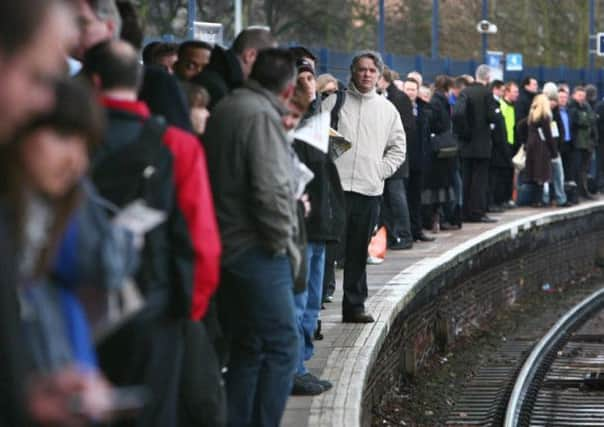Here's why your train's late - we've run out of drivers


A lack of staff was responsible for 9.42% of the 1.93 million incidents of disruption that occurred between April 1 2013 and December 12 last year, data from the Office of Rail and Road (ORR) shows.
Govia Thameslink Railway (GTR) - which is responsible for Thameslink, Southern and Gatwick Express services - was the worst affected operator with more than 62,000 incidents leading to 13.6% of its delays and cancellations.
Advertisement
Hide AdAdvertisement
Hide AdLondon Midland and First TransPennine Express had the joint next highest rate at 13.5%.
The lowest proportion of delays caused by crew shortages was Virgin Trains East Coast at 2.6%, followed by Virgin Trains West Coast at 3.7%.
Southern accepted in December that it does not have enough staff to carry out day-to-day operations and training without asking crew to work on rest days.
A statement released at the time read: “There continues to be a risk of cancellations, in particular during periods of high annual leave - but we are steadily overcoming this.”
Advertisement
Hide AdAdvertisement
Hide AdThe process of becoming a train driver takes more than a year. It includes a minimum of 240 hours in practical training and an additional 840 hours learning theory.
In September ScotRail revealed that it had received more than 12,000 applicants for 100 train driver jobs in a week.
A spokesman for train drivers’ union Aslef said crew shortages are caused by rail firms not recruiting enough drivers.
“The train companies are not in the business of providing a public service but of making as much money as possible,” he claimed.
Advertisement
Hide AdAdvertisement
Hide AdThe public performance measure used by the rail industry to calculate the proportion of trains that are on time only records long-distance services as being delayed if they arrive at their terminating station at least 10 minutes behind schedule, while commuter services must be at least five minutes late.
Under this measurement, punctuality has improved since 2002 but dipped slightly in recent years, reaching 89.2% for the last 12 months, according to Network Rail.
The Department for Transport said it closely monitors the number of trains that are cancelled or delayed due to a lack of crew and pledged to hold companies to account if “too many” are disrupted in this way.
A GTR spokesman insisted that the impact of crew shortages “is not the issue now that it was before Christmas”.
Advertisement
Hide AdAdvertisement
Hide AdHe went on: “We have the UK’s biggest-ever driver recruitment and training programme.
“Since January last year we have trained up and brought into work 154 additional drivers and there are 271 more in training with more to follow. That’s more trainees than we need for today’s operation but we know we’ll need more for new services and trains we’ll be running in the future to give passengers better service.”
A spokesman for the Rail Delivery Group, representing train operators and Network Rail, said: “Disruption to services, for whatever reason, means that train crews can be displaced and physically in the wrong place to crew a scheduled train. Other reasons, including sickness and annual leave, also have an impact.”